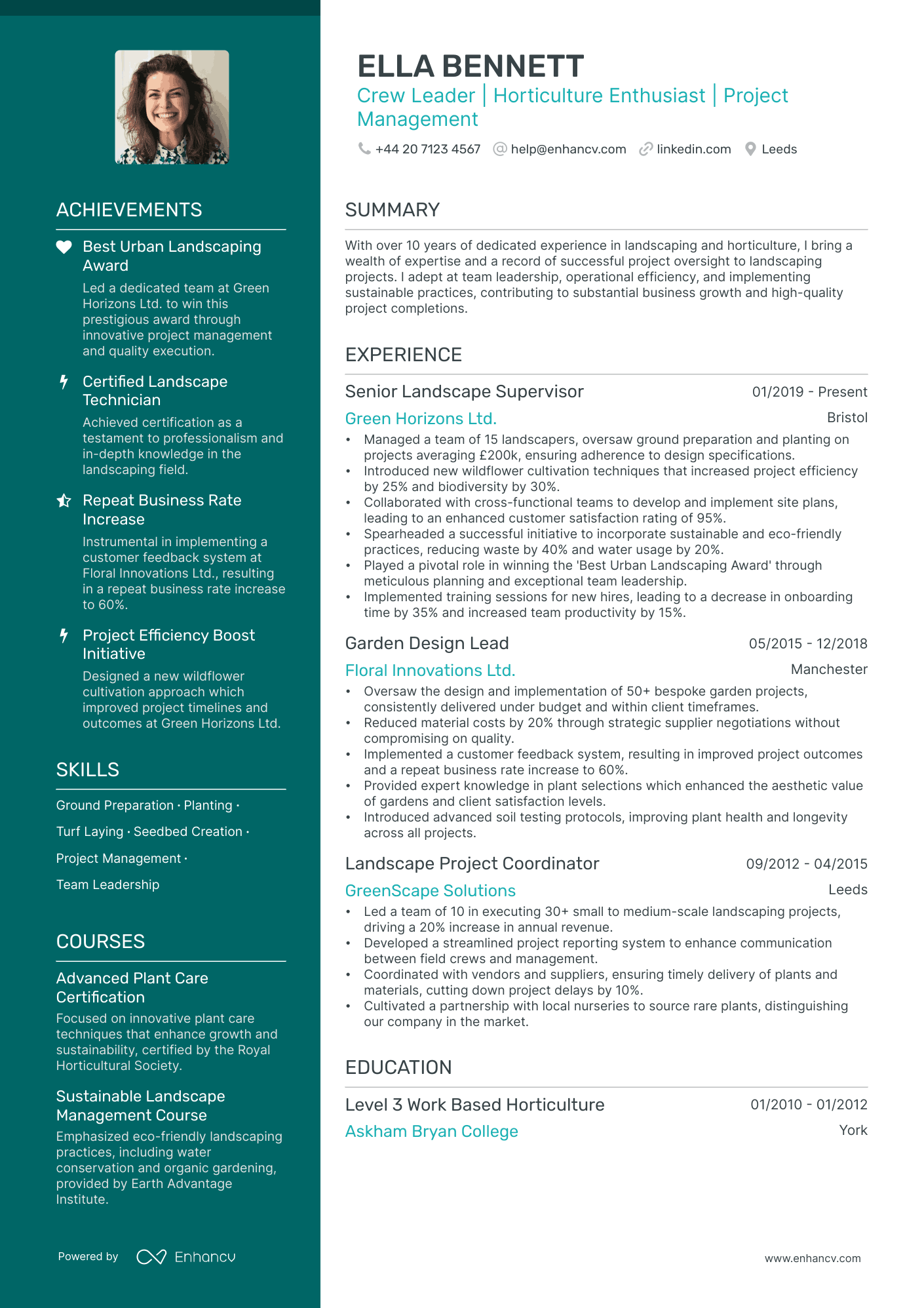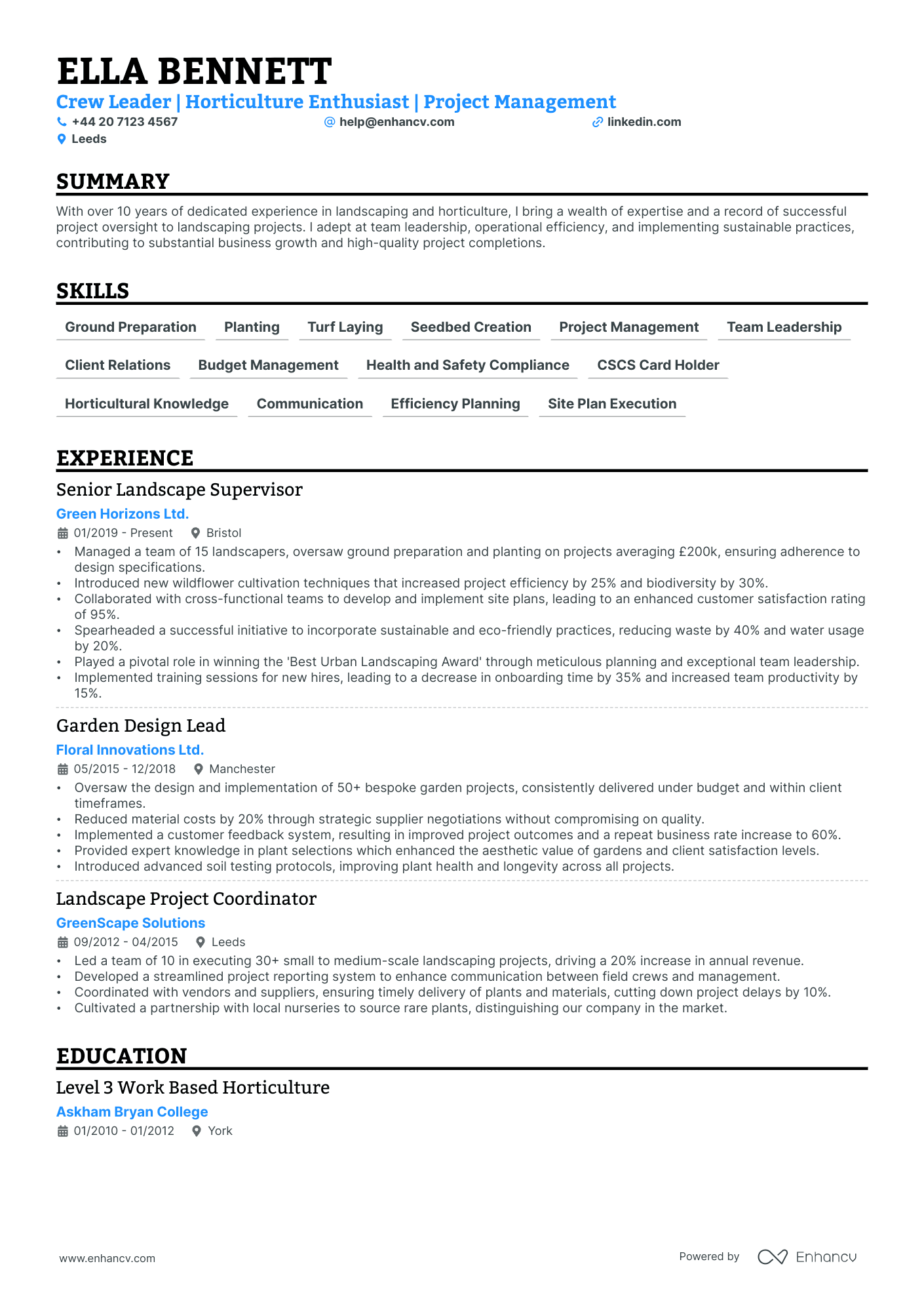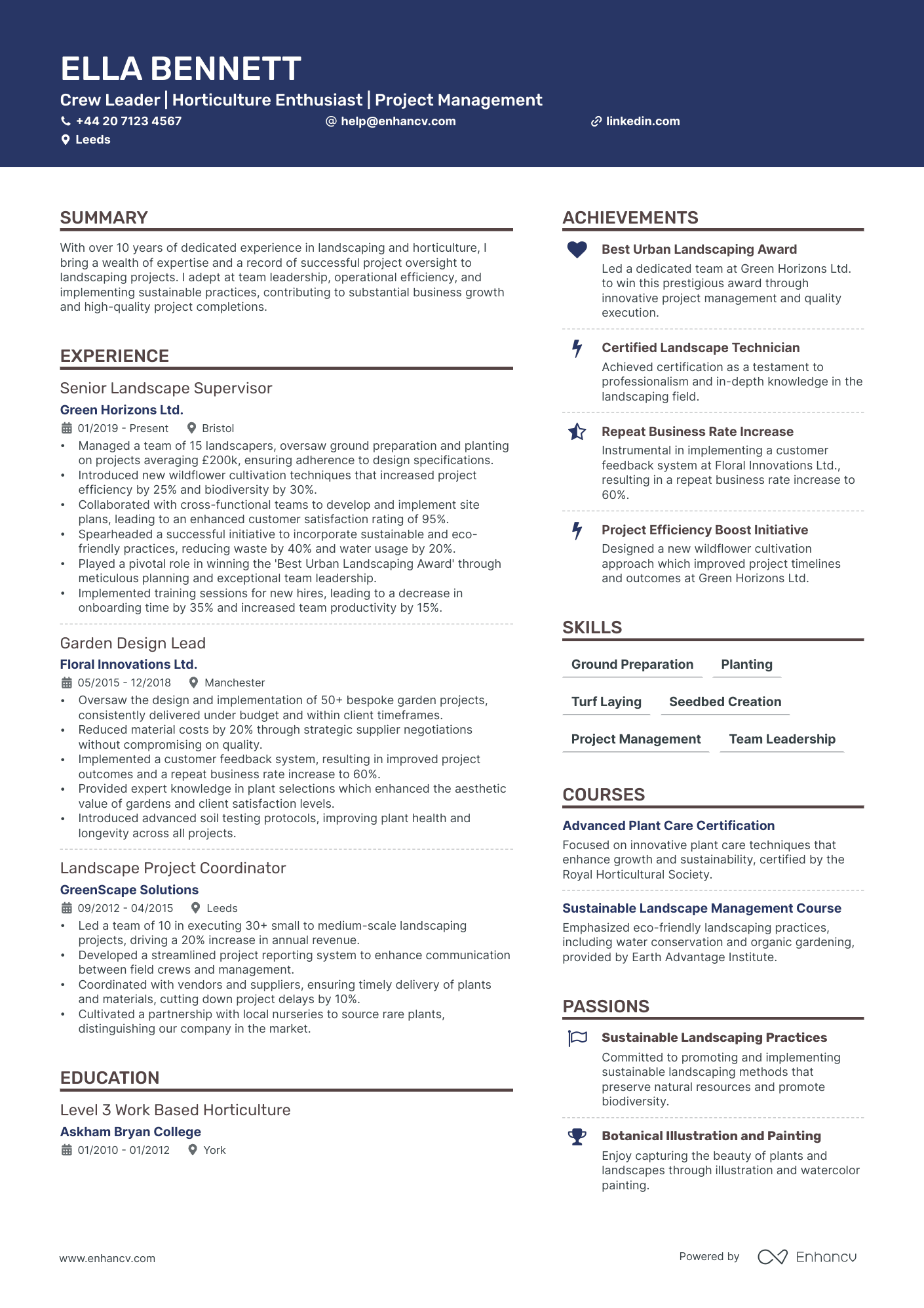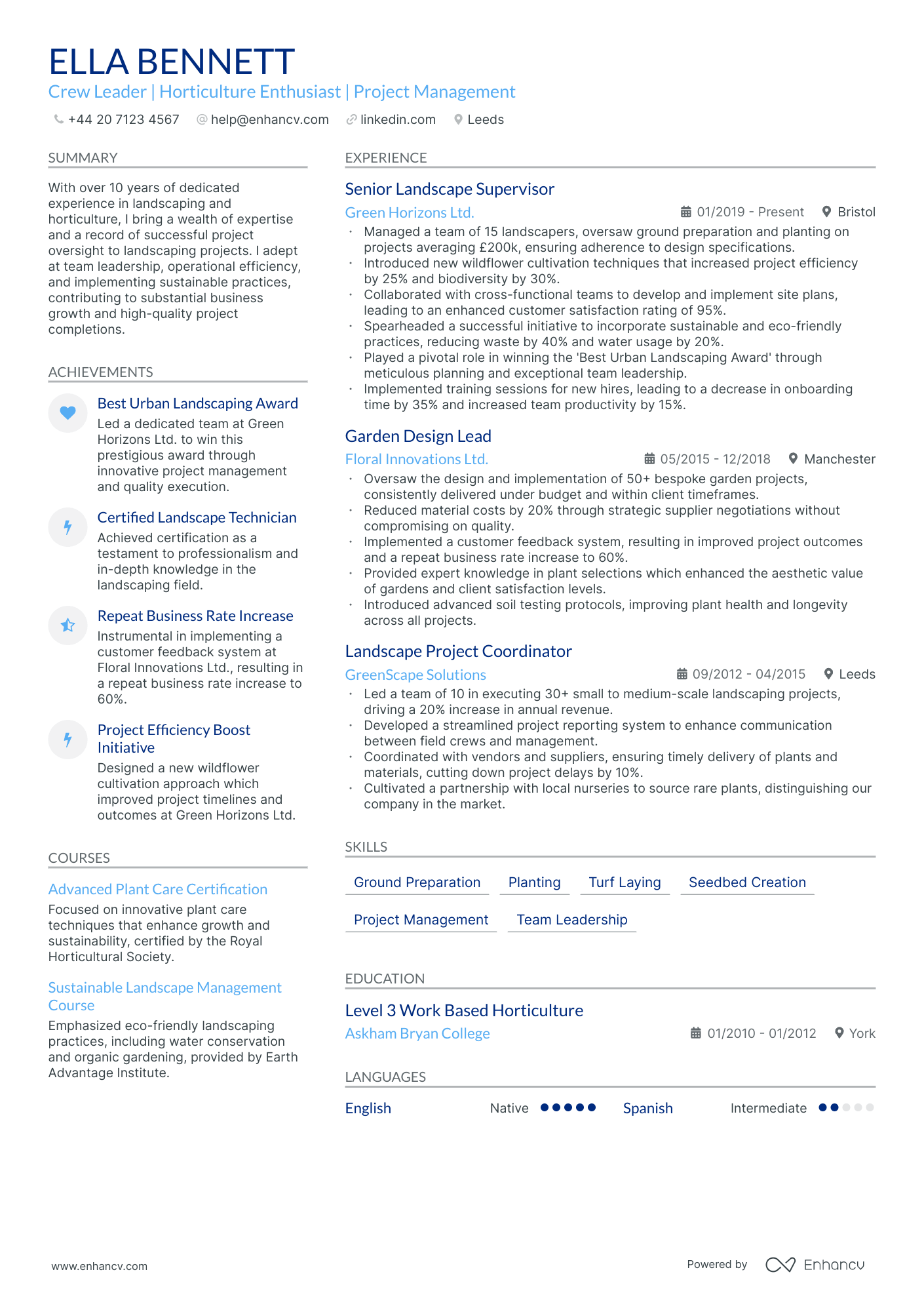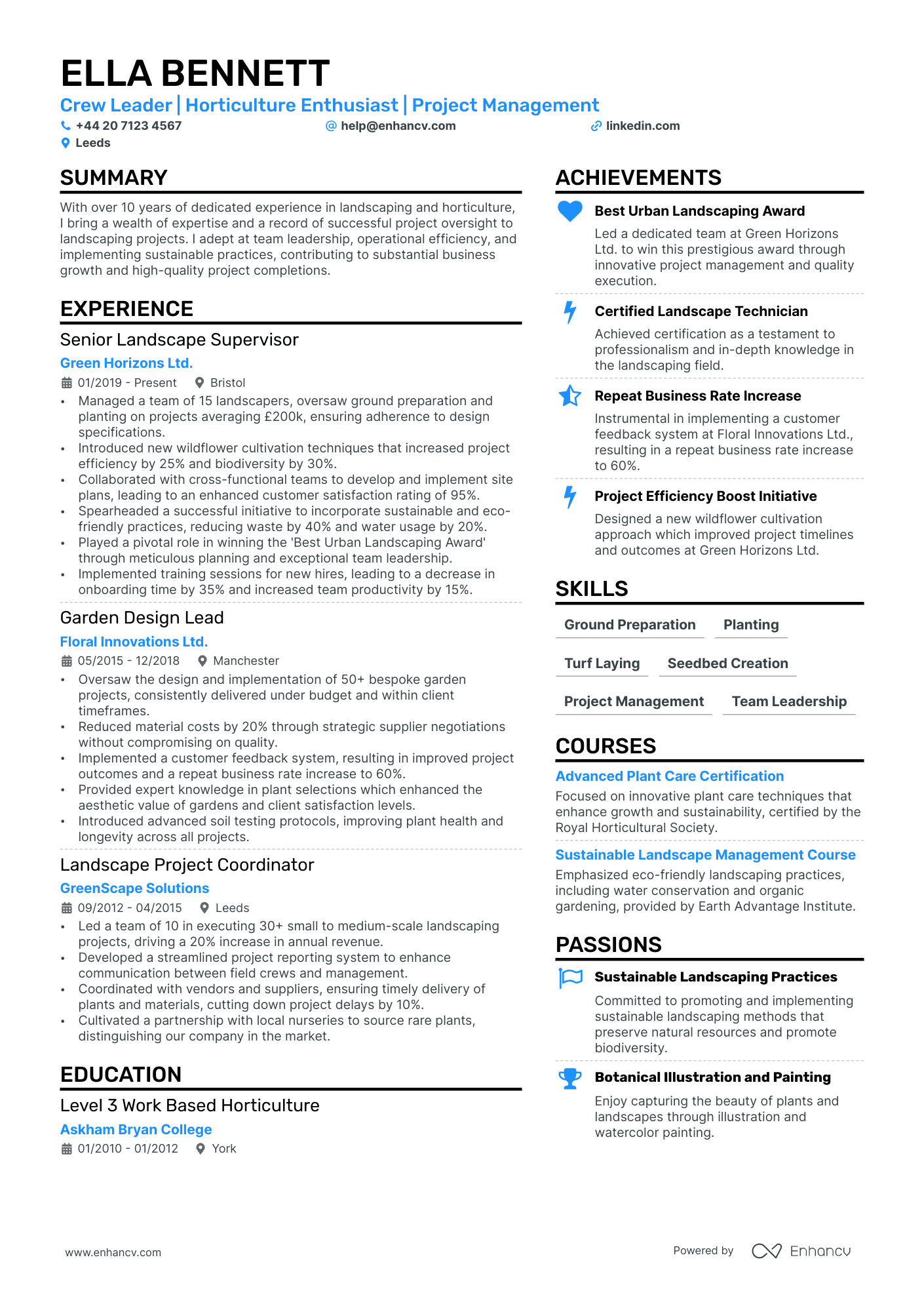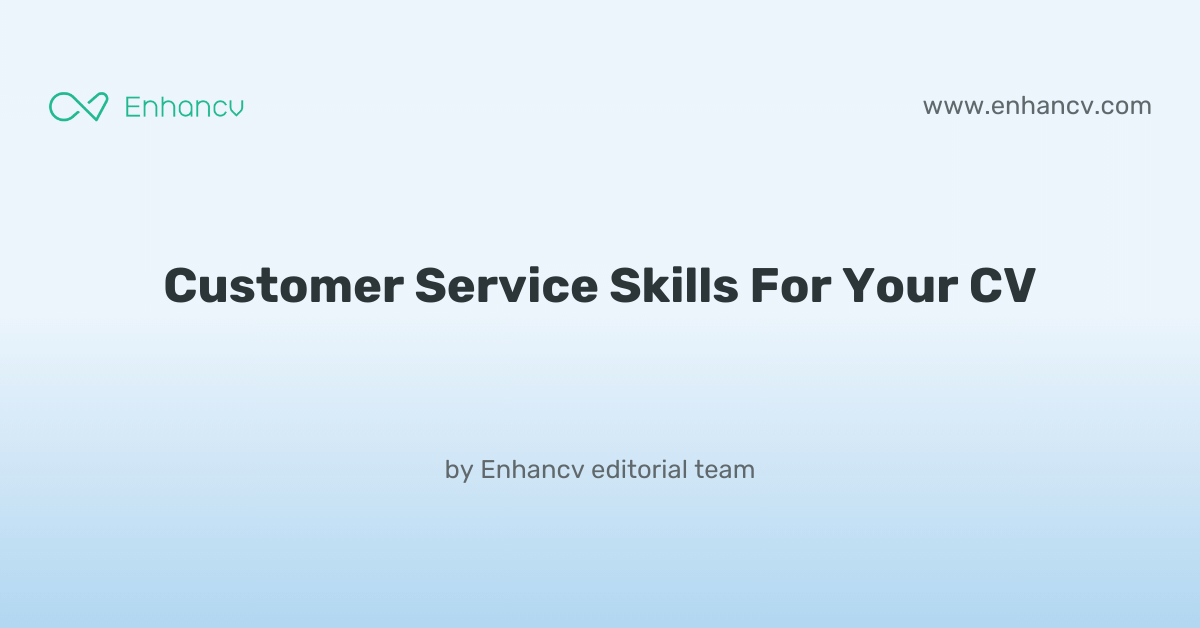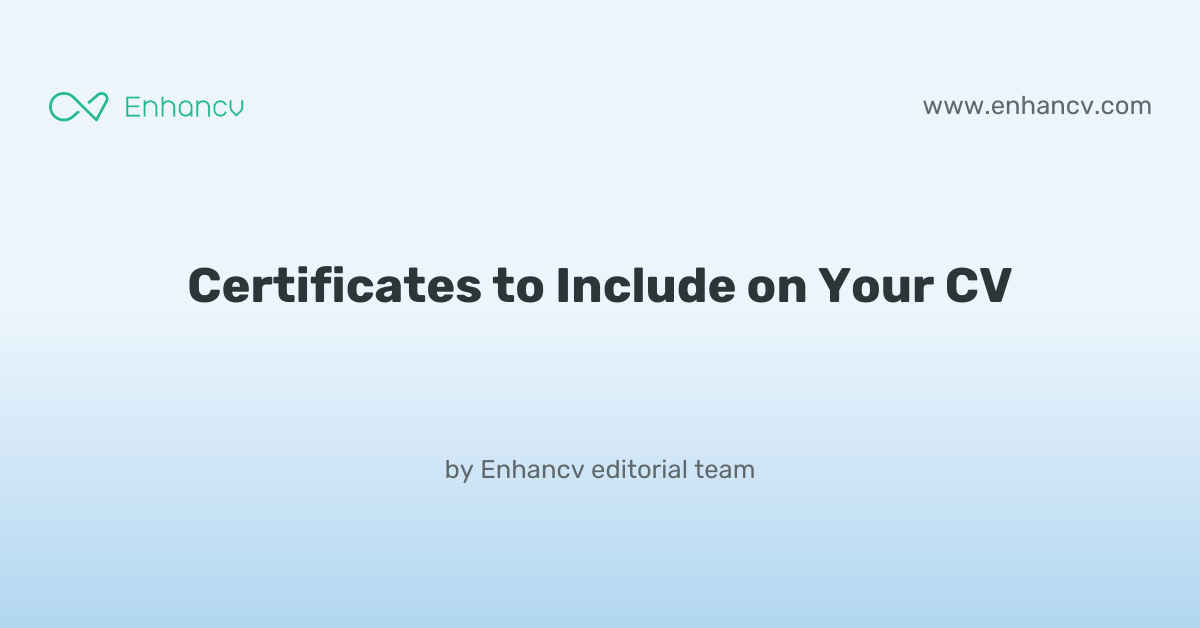One significant CV challenge in landscaping is ensuring your resume effectively showcases the practical skills and creative flair essential for this industry. Our comprehensive guide offers tailored advice and examples that will help you craft a CV that highlights your horticultural expertise and design competencies, setting you apart in the job market.
- Answer job requirements with your landscaping CV and experience;
- Curate your academic background and certificates, following industry-leading CV examples;
- Select from +10 niche skills to match the ideal candidate profile
- Write a more succinct experience section that consists of all the right details.
Do you need more specific insights into writing your landscaping CV? Our guides focus on unique insights for each individual role:
Structuring and formatting your landscaping CV for an excellent first impression
The experts' best advice regarding your CV format is to keep it simple and concise. Recruiters assessing your CV are foremost looking out for candidates who match their ideal job profile. Your white space, borders, and margins. You may still be wondering which format you need to export your CV in. We recommend using the PDF one, as, upon being uploaded, it never alters your information or CV design. Before we move on to the actual content of your landscaping CV, we'd like to remind you about the Applicant Tracker System (or the ATS). The ATS is a software that is sometimes used to initially assess your profile. Here's what you need to keep in mind about the ATS:- All serif and sans-serif fonts (e.g. Rubik, Volkhov, Exo 2 etc.) are ATS-friendly;
- Many candidates invest in Arial and Times New Roman, so avoid these fonts if you want your application to stand out;
- Both single and double column CVs can be read by the ATS, so it's entirely up to you to select your CV design.
PRO TIP
Be mindful of white space; too much can make the CV look sparse, too little can make it look cluttered. Strive for a balance that makes the document easy on the eyes.
The top sections on a landscaping CV
- Professional Summary showcases your passion for landscaping.
- Landscaping Experience details your practical skills.
- Education and Certifications highlight relevant qualifications.
- Horticultural Knowledge emphasises your plant expertise.
- Project Portfolio demonstrates your successful projects.
What recruiters value on your CV:
- Highlight your practical experience with specific landscaping projects, including the types and sizes of the areas you have worked on. Employers look for candidates with hands-on experience in garden design, horticultural work, and maintenance tasks.
- Emphasise any specialist skills such as knowledge of sustainable landscaping practices or experience with irrigation systems. These competencies can set you apart and show your commitment to modern, eco-friendly landscaping methods.
- Demonstrate a sound understanding of plant care by listing any relevant qualifications, such as a National Certificate in Horticulture or a degree in landscape architecture. Solid knowledge of botany, soil science, and pest management is often essential in this field.
- Include any proficiency with landscaping equipment and tools, such as lawn mowers, trimmers, and design software like CAD. Being adept with specialised machinery and technology can significantly enhance your efficiency and desirability as a candidate.
- Focus on your ability to work as part of a team, including examples of successful collaborative projects. Landscaping often requires teamwork, so showcase your communication skills and ability to contribute to a harmonious working environment.
Recommended reads:
Tips and tricks on writing a job-winning landscaping CV header
The CV header is the space which most recruiters would be referring most often to, in the beginning and end of your application. That is as the CV header includes your contact details, but also a headline and a professional photo. When writing your CV header:
- Double-check your contact details for spelling errors or if you've missed any digits. Also, ensure you've provided your personal details, and not your current work email or telephone number;
- Include your location in the form of the city and country you live in. If you want to be more detailed, you can list your full address to show proximity to your potential work place;
- Don't include your CV photo, if you're applying for roles in the UK or US, as this may bias initial recruiters' assessments;
- Write a professional headline that either integrates the job title, some relevant industry keywords, or your most noteworthy achievement.
In the next part of our guide, we'll provide you with professional CVs that showcase some of the best practices when it comes to writing your headline.
Examples of good CV headlines for landscaping:
- Lead Landscape Designer | Urban Green Spaces Specialist | RHS Certified | 10+ Years Experience
- Landscape Architect | Sustainable Design Expert | Environmental Planning | 5 Years Field Practice
- Senior Horticulturist | Plant Health & Botany Enthusiast | NVQ Level 4 in Horticulture | 8-Year Veteran
- Junior Landscape Technician | CAD & 3D Visualization Skills | Degree in Landscape Management | 2 Years Experience
- Garden Maintenance Manager | Expertise in Organic Practices | PA1/PA6 Pesticide Licensed | 6-Year Track Record
- Principal Groundskeeper | Sports Turf Management | Health & Safety Certified | Over 12 Years Leading Teams
Your landscaping CV introduction: selecting between a summary and an objective
landscaping candidates often wonder how to start writing their resumes. More specifically, how exactly can they use their opening statements to build a connection with recruiters, showcase their relevant skills, and spotlight job alignment. A tricky situation, we know. When crafting you landscaping CV select between:
- A summary - to show an overview of your career so far, including your most significant achievements.
- An objective - to show a conscise overview of your career dreams and aspirations.
Find out more examples and ultimately, decide which type of opening statement will fit your profile in the next section of our guide:
CV summaries for a landscaping job:
- With a verdant touch cultivated over 8 years as a professional landscaper, I possess advanced knowledge in sustainable horticulture, garden design, and irrigation systems. Spearheaded a large-scale botanical garden restoration that increased annual visitations by 30%.
- A seasoned horticulturist with 10 years of experience, I have honed skills over a diverse array of environments—from arid deserts to lush rainforests. Achieved a successful transformation of an abandoned city lot into a thriving community garden enjoyed by locals and tourists alike.
- Transitioning from a 6-year career in architecture to landscape design, I bring profound spatial awareness and creativity, complemented by advanced CAD skills. My academic thesis on urban green spaces implementation was awarded 'Best Innovation' by a recognised environmental body.
- After dedicating 7 years to environmental science, I am eager to apply my in-depth knowledge of ecosystem dynamics and conservation practices to create impactful, sustainable landscapes that serve as green oases in urban settings.
- Eager to embark on a professional journey in landscaping, I aim to apply my passion for nature and strong work ethic to contribute to the creation of beautiful, functional outdoor spaces that align with the latest ecological advances and aesthetic trends.
- Aspiring to dive into the world of landscaping, my objective is to leverage a keen eye for detail and a profound appreciation for outdoor environments to curate aesthetically pleasing and environmentally sound landscapes that enhance public and private spaces.
Best practices for writing your landscaping CV experience section
If your profile matches the job requirements, the CV experience is the section which recruiters will spend the most time studying. Within your experience bullets, include not merely your career history, but, rather, your skills and outcomes from each individual role. Your best experience section should promote your profile by:
- including specific details and hard numbers as proof of your past success;
- listing your experience in the functional-based or hybrid format (by focusing on the skills), if you happen to have less professional, relevant expertise;
- showcasing your growth by organising your roles, starting with the latest and (hopefully) most senior one;
- staring off each experience bullet with a verb, following up with skills that match the job description, and the outcomes of your responsibility.
Add keywords from the job advert in your experience section, like the professional CV examples:
Best practices for your CV's work experience section
- Designed and implemented diverse residential and commercial landscape projects, creating aesthetically pleasing and sustainable environments tailored to client specifications.
- Led teams in routine maintenance tasks such as mowing, pruning, fertilising, and pest control, ensuring client satisfaction through high-standard upkeep of garden spaces.
- Successfully operated a variety of landscaping equipment, including lawnmowers, leaf blowers, and irrigation systems, adhering to safety protocols and maintenance schedules.
- Conducted soil analysis and plant selection, choosing the most suitable flora for different climates and soil types to ensure the longevity and health of garden installations.
- Provided expert advice on garden design, offering clients innovative solutions for space utilisation, plant arrangement, and landscape features to enhance outdoor living areas.
- Managed inventory of landscaping supplies and materials, demonstrating effective cost control and resource management, ensuring project completion within budget.
- Coordinated with suppliers, contractors, and design teams to facilitate timely project execution, maintaining clear communication and resolving any on-site issues promptly.
- Implemented water-efficient landscaping techniques such as drip irrigation and xeriscaping to promote environmental conservation and reduce clients' long-term maintenance costs.
- Utilised computer-aided design (CAD) software to visualise landscape concepts, presenting professional plans and sketches to clients and stakeholders for project approval.
- Designed and implemented custom garden layouts for over 50 residential clients, leading to a 20% increase in customer satisfaction according to annual surveys.
- Successfully managed a team of 5 junior landscapers, providing training and guidance that resulted in a 15% increase in team efficiency.
- Operated and maintained a variety of landscaping equipment safely, reducing equipment malfunction incidents by 30% through regular checks and maintenance routines.
- Oversaw the complete redesign of a 5-acre commercial property, which enhanced the client's brand image and contributed to a 25% increase in foot traffic.
- Coordinated the procurement of plants and materials, achieving a 10% cost reduction by establishing strong relationships with suppliers.
- Implemented an environmentally sustainable waste management system that decreased landscape waste by 40%, aligning with company's green initiatives.
- Directed multiple high-profile landscaping projects simultaneously, ensuring all projects were completed on time, within budget, and to the highest standard.
- Enhanced team productivity by 20% through the introduction of a collaborative project management software, streamlining communication and task delegation.
- Cultivated a culture of safety resulting in zero workplace accidents over a 12-month period, through rigorous safety training and regular briefings.
- Specialised in the cultivation and care of over 200 plant species, significantly enhancing the biodiversity of green spaces managed by the firm.
- Optimised irrigation systems across all projects, which conserved an estimated 1 million gallons of water per year.
- Developed a successful lawn care program that improved the health and appearance of over 100,000 square feet of turf, resulting in a client retention rate of 95%.
- Crafted and executed innovative landscape designs that won the 'Best Garden Award' two years in a row at the local Garden Show Exhibition.
- Pioneered the use of drought-resistant plant varieties which reduced clients' water usage by an average of 35%, supporting local water conservation efforts.
- Led public space renewal projects that rejuvenated 3 municipal parks, providing the community with vibrant green spaces for recreation and gatherings.
- Successfully delivered a large-scale landscaping project ahead of schedule, which generated an additional revenue stream from early completion bonuses.
- Implemented a workforce training initiative that improved planting and maintenance skills, seeing a 15% uplift in overall project quality and client satisfaction.
- Championed the installation of smart landscape lighting systems in over 25 commercial properties, enhancing security and aesthetics while reducing energy costs.
- Custom-engineered a unique water feature for a luxury hotel that became the centrepiece of their outdoor space, and was featured in a prominent lifestyle magazine.
- Developed and maintained an organic vegetable garden for a community project, which provided fresh produce to local residents and taught sustainable practices.
- Introduced permaculture principles to landscaping projects, which improved soil health and reduced the need for chemical fertilisers, benefiting local ecosystems.
- Played a pivotal role in initiating a company-wide green initiative to plant native species throughout our projects, increasing local flora and fauna by 35%.
- Reduced the annual spend on plant replacements by 20% through enhanced disease diagnosis and treatment procedures, cutting losses and extending plant longevity.
- Established a recycling program for yard waste that repurposed 75% of material into mulch and compost, significantly reducing disposal costs and benefiting soil health.
Writing your CV without professional experience for your first job or when switching industries
There comes a day, when applying for a job, you happen to have no relevant experience, whatsoever. Yet, you're keen on putting your name in the hat. What should you do? Candidates who part-time experience , internships, and volunteer work.
Recommended reads:
PRO TIP
Include examples of how you adapted to new tools, environments, or work cultures, showing your flexibility.
Hard skills and soft skills to showcase your unique skill set on your landscaping CV
Did you know that your CV will mostly likely be assessed by recruiters based on skill alignment? And that means that the way you feature your key skills across different CV sections will play a crucial role in landing you that first interview. We recommend you add your:
- technical capabilities or hard skills in your CV experience, certificates, projects, etc. Use your past accomplishments to prove your technical capabilities. List up to a dozen different software or hardware in your dedicated skills section to match the job keywords;
- personal and communication skills or soft skills in your CV strengths, achievements, summary/ objective, etc. Soft skills are a bit more difficult to prove. How do you define your aptitude in active listening? So, instead of just listing the skill name, include a tangible metric to show your success.
On a final note, when you're in a hurry to create your profile, you may misspell a particular technology or soft skill. That's why we suggest you copy and paste the particular skill name (or keyword), directly from the job advert. This would also help you to pass any initial Applicant Tracker System (ATS) tests.
Top skills for your landscaping CV:
Plant Identification
Soil Management
Landscape Design
Garden Maintenance
Hardscape Installation
Irrigation System Installation
Pesticide Application
Power Tools Operation
Turf Management
Arboriculture Knowledge
Creativity
Communication
Time Management
Problem Solving
Client Relations
Adaptability
Teamwork
Attention to Detail
Physical Stamina
Project Management
PRO TIP
If you have received professional endorsements or recommendations for certain skills, especially on platforms like LinkedIn, mention these to add credibility.
Further professional qualifications for your landscaping CV: education and certificates
As you're nearing the end of your landscaping CV, you may wonder what else will be relevant to the role. Recruiters are keen on understanding your academic background, as it teaches you an array of hard and soft skills. Create a dedicated education section that lists your:
- applicable higher education diplomas or ones that are at a postgraduate level;
- diploma, followed up with your higher education institution and start-graduation dates;
- extracurricular activities and honours, only if you deem that recruiters will find them impressive.
Follow a similar logic when presenting your certificates. Always select ones that will support your niche expertise and hint at what it's like to work with you. Balance both technical certification with soft skills courses to answer job requirements and company values. Wondering what the most sought out certificates are for the industry? Look no further:
PRO TIP
If there's a noticeable gap in your skillset for the role you're applying for, mention any steps you're taking to acquire these skills, such as online courses or self-study.
Recommended reads:
Key takeaways
Impressing recruiters with your experience, skill set, and values starts with your professional landscaping CV. Write concisely and always aim to answer job requirements with what you've achieved; furthermore:
- Select a simple design that complements your experience and ensures your profile is presentable;
- Include an opening statement that either spotlights your key achievements (summary) or showcases your career ambitions (objective);
- Curate your experience bullets, so that each one commences with a strong, action verb and is followed up by your skill and accomplishment;
- List your hard and soft skills all across different sections of your CV to ensure your application meets the requirements;
- Dedicate space to your relevant higher education diplomas and your certificates to show recruiters you have the necessary industry background.
